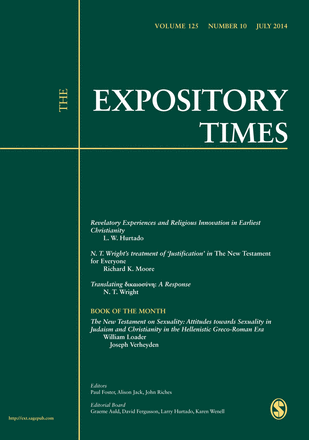 Former Vose New Testament lecturer, Richard Moore has an article in the present issue of Expository Times (Vol. 125, No. 10 (July 2014)), together with a response from NT Wright. (There are other Perth links in the issue with a review of Matthew Malcolm’s The World of 1 Corinthians, and a review article of Bill Loader’s The New Testament on Sexuality: Attitudes towards sexuality in Judaism and Christianity in the Hellenistic Greco-Roman Era).
Former Vose New Testament lecturer, Richard Moore has an article in the present issue of Expository Times (Vol. 125, No. 10 (July 2014)), together with a response from NT Wright. (There are other Perth links in the issue with a review of Matthew Malcolm’s The World of 1 Corinthians, and a review article of Bill Loader’s The New Testament on Sexuality: Attitudes towards sexuality in Judaism and Christianity in the Hellenistic Greco-Roman Era).
Richard’s article is sharply focussed on a particular issue: how Wright translates the Greek word dikaiosunē (“righteousness,” “justification”) and its cognates in Wright’s translation of the Greek New Testament into English (The New Testament for Everyone). Richard has two interests at work here: first, he has spent a lifetime exploring Paul’s use and doctrine of dikaiosunē, in the New Testament, in the history of the church, and English bible translations; and second, he has just completed his own translation of the New Testament Under the Southern Cross: The New Testament in Australian English, to be published later this year.
Richard finds fault with Wright’s translation because of the many different English words Wright uses to translate the same Greek word: “This can only confuse his reader, and, of course, prevent the reader from hearing what Paul is actually saying in this section” (485). A subsidiary concern is that Wright’s translation is idiosyncratic, illegitimately importing notions of covenant theology into Paul’s theology of justification, whereas for Richard, “Paul was not a covenant theologian” (485; original emphasis).
In his response to Richard’s article, Wright defends his translation by focussing on the covenantal context of the primary Old Testament passages from the Abrahamic narrative, and by using his own linguistic arguments to demonstrate that Paul has the Septuagint in mind as he writes, which links covenant and righteousness. Though Paul only infrequently uses covenantal language, the whole context of the passages he is citing from Genesis are covenantal in nature, where God’s gift of right relationship is grounded in God’s covenant. Wright therefore argues that his translation attempts to elucidate what he considers to be Paul’s theological perspective, and that it requires the kind of English language terms and idioms he has used.
What is evident in this minor dispute is that the two authors have two ways of approaching the tasks of exegesis and biblical theology. At the level of translation, Richard appropriately argues for consistency so that the English translation has strong linguistic connections with the underlying Greek text. His argument is not, I think, without merit this point, for it appears that Wright goes beyond translation to exposition by importing his particular understanding of Paul into the work of translation.
I am not competent, ultimately, to adjudicate this dispute about what constitutes faithful interpretation. My interest concerns the way these two theologians have read the biblical text, at least as that is represented in these two articles. At base, there is a fundamentally different understanding between the two authors, as to what, precisely, Paul means when he uses dikaiosunē language. It seems that the root of this difference are different ways of reading Scripture, with different weight being given to linguistic, grammatical, and narrative features of the biblical texts. Both authors read Scripture theologically, and both bring an interpretation to Paul. But since their method of engaging Scripture differs, so too do their resulting theologies.